
Related
Topics
Guests
- Craig Ungercontributing editor at Vanity Fair and author of the New York Times bestseller “House of Bush, House of Saud.” His latest book is called “The Fall of the House of Bush.”
The Bush administration has announced plans to sell Saudi Arabia around $120 million in sophisticated bombs. The sale would come as part of the White House’s $20 billion military aid package to its Gulf allies. The announcement came as President Bush began a two-day visit to Saudi Arabia for meetings with Saudi King Abdullah. We speak with Craig Unger, author of “House of Bush, House of Saud.” [includes rush transcript]
Transcript
AMY GOODMAN: The Bush administration has announced plans to sell Saudi Arabia around $120 million in sophisticated bombs. The sale would come as part of the White House’s $20 billion military aid package to the Gulf region. The announcement came as President Bush began a two-day visit to Saudi Arabia for meetings with Saudi King Abdullah. The Democratic-led Congress has thirty days to block the deal, but Democratic leaders have already indicated they’ll let it pass.
Craig Unger is a contributing editor at Vanity Fair, author of the New York Times bestseller House of Bush, House of Saud
. His latest book is called The Fall of the House of Bush. Craig Unger joins me now in the firehouse studio.
Welcome to Democracy Now! First, Craig, your assessment of President Bush’s trip to Saudi Arabia, why he went there? It’s the first for him.
CRAIG UNGER: Well, I think it’s a good opportunity to look at the decline of American power going back to 9/11. If you go back to that point, back then the price of oil was $28 a barrel. Just after 9/11, the Saudis flooded the oil market to reduce the price of oil in a show of good will. Of course, fifteen out of nineteen hijackers were Saudis, but they needed to win approval from the United States.
Today, the US is in a much, much weaker position. And Bush goes there with a $20 billion weapons package. That’s about all he has to offer. At the same time, he’s trying to bring down the price of oil. I think he’ll have very little success there. And the price of oil has more than quadrupled to about $100 a barrel. He also wants the Saudis to put pressure on Iran to help isolate Iran in the region, and I think he’s going to have very little success in that, as well.
AMY GOODMAN: And this military package that he is bringing, talking about $120 million in sophisticated bombs, part of a $20 billion military package to the region, the lion share of it going to Saudi Arabia?
CRAIG UNGER: Right. Well, theoretically, that’s supposed to be used to ward off the Iranian threat. You know, interestingly enough, there was a press conference in Israel this week in which they said the smart bombs they were getting were smarter than the smart bombs we were selling to Saudi Arabia.
AMY GOODMAN: So, in fact, is it about countering the US’s giving to Israel and then giving to Saudi Arabia and Egypt?
CRAIG UNGER: Exactly. We’re sort of playing both sides of the fence. But at the same time, we’re trying to pressure the Saudis to isolate Iran, and the Saudis have been rather conciliatory towards Iran. You see the Shiite-Sunni conflict going throughout the region. It started in the war in Iraq, of course. But recently, Ahmadinejad was a guest of Saudi Arabia at the Hajj in Mecca, and he and King Abdullah were also seen walking arm in arm at the Gulf Council of Cooperation. So they’ve not been as hostile to each other as Bush would like.
AMY GOODMAN: Can you talk about this longtime relationship that you have well documented in your book House of Bush, House of Saud and how it has changed? I mean, wasn’t — well, they called him “Bandar Bush” at the time, the Saudi ambassador to the United States, one of the first people from the outside coming into the White House after 9/11, the next night, smoking cigars with President Bush.
CRAIG UNGER: Exactly. This was one of the closest relationships between a president of the United States and another foreign leader in American history. And I’m talking about Bush, Sr., Bush 41, George H.W. Bush, who was very, very close friends with Prince Bandar, the Saudi ambassador to the United States for more than twenty years. And you saw right after 9/11 that he came into the White House. He was — even though he was much closer in age to the younger George Bush, they were not nearly as close personally. And yet, just after 9/11, we had the now-famous Saudi evacuation from the United States at a time when American airspace was all but shut down.
AMY GOODMAN: So no planes allowed to take off, and only one, the plane that was filled with Saudis that the Bush administration, the White House, allowed to take off and leave, with bin Ladens.
CRAIG UNGER: Right. Private aviation was still shut down, and you saw these charter flights start in Florida and pick up Saudis all over the country back then. So this was an extraordinarily close relationship.
It has gotten much worse, however. And the Saudis have been very displeased with Bush’s strong support of Israel, his failure to crack down on Israel in the Israeli-Palestinian conflict. And even before 9/11, King Abdullah almost broke with the United States. He was drawing effectively a line in the sand just before 9/11. Now, of course, Bandar is no longer ambassador to the United States. The relationship has worsened considerably.
And again, most recently, we saw it at the Annapolis conference. Bush got the Saudis to come to the Annapolis peace conference about the Israeli-Palestinian conflict. He got other Sunni Arab allies — Egypt and Jordan — to come, as well. But since then, we’ve seen Israel is still supporting more settlements on the West Bank. The United States is not putting pressure on them. So the Sunni leaders feel sort of embarrassed at home for having gone out on a limb and attended the Annapolis conference.
AMY GOODMAN: Newsweek has a big piece, “The Growing Power of Petro-Islam: In Saudi Arabia, Bush Encounters a Force More Powerful than Democracy.”
CRAIG UNGER: Well, absolutely. I mean, Bush has talked a lot about democratizing the Middle East, but Saudi Arabia, of course, is a brutal monarchy. And you’re not going to see him putting pressure on Saudi Arabia now. He’s not really in a position to. The United States is very much beholden to what allies — what few allies remain in the Middle East. And, of course, we are addicted to oil.
AMY GOODMAN: We’re talking to Craig Unger. His latest book is The Fall of the House of Bush. President Bush right now in Saudi Arabia. The issue of Iraq and Saudi Arabia, the Shia, the Sunni, Saudi Arabia and oil, where Saudia Arabia stands in the Iraq war?
CRAIG UNGER: Well, there were a lot of unintended consequences from the Iraq war, and one, of course, was the — that has infected the entire region has been this Sunni-Shiite conflict. And Saudi Arabia, of course, is largely a Sunni population. And if you look at who has caused the American deaths in Iraq, it’s largely Sunnis who have come down, who have been attacking Americans. And that’s a result of the de-Baathification and the purging of Saddam’s supporters from the government.
In recent months, since the surge, the United States has reversed policy and has started to back the Sunnis again and allow them back into the government. Al-Maliki’s government in Iraq has done that, as well. And to some extent, that should alleviate some of the tension that the Saudis — that had displeased the Saudis.
AMY GOODMAN: And the fact that most of the oil lies under, from Iraq to Saudi Arabia, under Shia land, the Wahhabi sect actually hostile to Shia?
CRAIG UNGER: Absolutely. There is a substantial Shiite population in Saudi Arabia, and that does happen to be in — very much in the oil-rich provinces.
AMY GOODMAN: Finally, the US media’s coverage of Saudi Arabia, how it toes the line in Washington, what do you think it is missing?
CRAIG UNGER: Well, Saudi Arabia can be a very, very brutal country. And, you know, we hear again and again about Bush’s policies to democratize the Middle East. I think if you look at the neoconservative vision, which talks again about democratization, democratization, it’s really much more about strategic domination of the Middle East, and it’s been a vision to take over Iraq and eventually Iran.
One of the developments in recent months that has really undermined Bush’s position during this visit has been the National Intelligence Estimate that came out about Iran that showed that Iran does not have an active nuclear weapons program. And this comes at a time when Bush has been trying again and again to isolate Iran. It looked as if the Bush administration was actually preparing to attack Iran again, but the NIE has undermined that. And it also — here again, you have Bush trying to put pressure on the Saudis to isolate Iran, but the NIE went completely against that.
AMY GOODMAN: Do you think there will be a major difference with US relations in Saudi Arabia when Bush leaves office?
CRAIG UNGER: Not really. I think we are so dependent on oil that we kind of need the Saudis.
AMY GOODMAN: Craig Unger, I want to thank you for joining us. His latest book is called The Fall of the House of Bush.

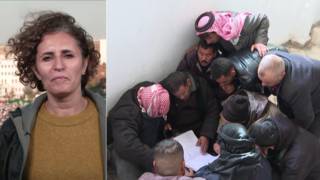
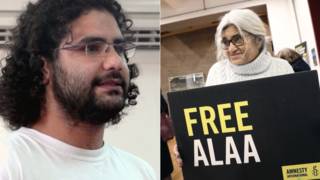
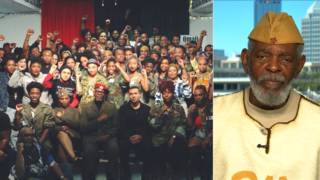
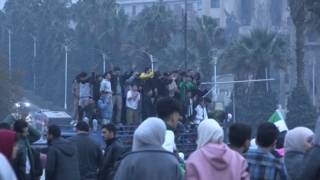





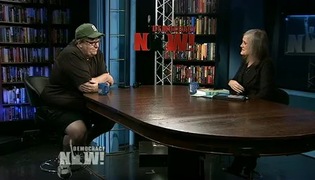

Media Options